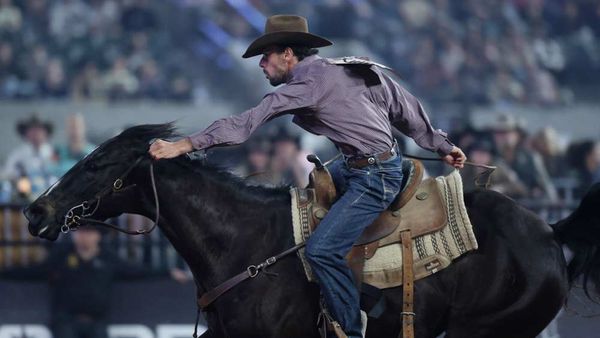April 5, 2014
The 'Fingers of God' Reach Down :: Nat Segaloff on His Silliphant Bio
Kilian Melloy READ TIME: 11 MIN.
Stirling Silliphant made a mark quite unlike most others on the American cultural landscape. As a writer, he was beyond prolific, penning the bulk of the peripatetic TV drama "Route 66" (and receiving credit in one way or another for all 116 episodes), as well as being credited in various capacities for 37 of the 138 episodes of "The Naked City," another late 1950s / early 1960s-era TV series.
Silliphant exhibited a creative streak that seemingly strained to break the bonds of television's usual narrow confines. A visionary (so to speak) drama about a blind insurance investigator, "Longstreet," premiered in 1971 and challenged assumptions about what the differently abled are capable of accomplishing. But the show lasted only a single season.
Silliphant was also impassioned on the subject of Vietnam, and Segaloff's book recounts how he yearned to create a television program, wide in scope and detailed in history, about a nation the United States had, at the time, recently been in conflict with. The project never gained traction.
A novelist in his own right, Silliphant's best known screenplays were based on the novels written by others, such as "In the Heat of the Night" (for which Silliphant won an Oscar�), "The Poseidon Adventure," and "The Towering Inferno" (for which Silliphant drew on two different novels). Silliphant also adapted "Charly," based on the Daniel Keyes novel of the same name, the John Wyndham sci-fi chiller "Village of the Damned," Truman Capote's "The Grass Harp," and Joseph Wambaugh's best-selling cop novel "The New Centurions" to the screen... not to mention a chapter in the "Dirty Harry" saga and a "Shaft" sequel! (Those last two built on characters from existing works, but the stories were original.)
Later in his career, Silliphant also wrote the television miniseries adaptation of James Michener's sprawling novel "Space," as well as authoring the teleplays for the three-episode miniseries "Pearl" (about the attack on Pearl Harbor) and the seven-hour "Mussolini: The Untold Story."
Reading the new Silliphant biography, "The Fingers of God," one comes away with the impression that Silliphant was as avid about experiencing life as he was about telling stories via the written word. A martial arts enthusiast (Siliphant essentially discovered Bruce Lee), he was as prolific a correspondent as he was a screenwriter and novelist. Some of his correspondence was with Segaloff himself, who had written about Silliphant in an earlier project; the two men forged a connection, and after Silliphant's death his widow Tiana approached Segaloff about telling the writer's story.
EDGE interviewed Segaloff in March of 2013 about his previous book, "Final Cuts: The Last Films of 50 Great Directors" a collection of essays examining the thematic relationships between the valedictory cinematic essays of, as the subtitle has it, "50 Great Directors," and their lives and filmographies as a whole. Being a longtime film critic and scholar, Segaloff's insights made for a compelling read; now that he has only one individual to focus on in "The Fingers of God," there's a sense of illumination that's something more than mere scrutiny, and sympathy that refuses to sidestep critical observation.
EDGE had a chance recently to catch up with Segaloff once again, this time about Stirling Silliphant's fascinating life, his contradictory character, and his wide-ranging body of work.
EDGE: Stirling Silliphant was incredibly prolific as a screenwriter both for television and film, and yet, as your biography of him notes, he regretted not having lived abroad and carved out a career primarily as a novelist. Do you have a sense that Silliphant really was all that dissatisfied with his career in films and TV?
Nat Segaloff: It's a bizarre thought that somebody who was so successful at his chosen profession would have chosen another one, but Stirling liked challenges, and I suspect that he became bored with the quality of the projects he was being offered and got bored with being able to knock out scripts so easily, even though what came easily to him would have stymied others. He also got fed up with the Hollywood bullshit that he had to wade through in order to get to write something, and that he had to surmount in order to produce the projects he really cared about.
EDGE: Given how TV is trending more toward "novelistic" story and character arcs in the last decade or so, would Silliphant have been happier working in today's Hollywood environment?
Nat Segaloff: In point of fact, Stirling arguably helped start the novelistic trend in television back when they were called "mini-series." He wrote "Pearl" (1978), "Mussolini: The Untold Story" and "Space" (both 1985), and "The Brotherhood of the Rose" (1989). He had to pass on scripting "Roots" (1977) in because of a commitment to do Clint Eastwood's "The Enforcer" (1976). He also desperately wanted to write and produce a 13-part series on Vietnam.
And, no, he wouldn't have been happier working in today's Hollywood environment, not because of the occasional maturity that the medium now offers but because of the lack of maturity of the people responsible for green-lighting it. Stirling never dealt with development managers or production VPs, he always went straight to the top, to the person who could say Yes or No without having to consult focus groups or a committee.
EDGE: Silliphant was something of an auteur for early television, given how much of two iconic American TV shows -- "Naked City" and "Route 66" -- he wrote. Those series share an unusual characteristic in that they both tended to focus less on the regular characters than on the "guest" characters that were part of that week's episode. Did Silliphant personally prefer to take a broader view rather than focus intently on two or six characters?
Nat Segaloff: The irony of TV series during the '50s and '60s (and I am going to drop Richard Chamberlain's name because it was he who brought this to my attention years ago) is that the guest stars tended to do a better job than the series regulars because they were the ones who got the scripts ahead of time and had more chance to study their parts. Moreover, writers were under strict constraints not to change the regular characters lest the audience lose interest in them. This is why series regulars get bored (if rich) and why the guest stars have the best parts.
The challenge to Silliphant and his co-producer Herbert B. (Bert) Leonard was finding new stories that would keep "Naked City" and "Route 66" lively. It got to the point on the former series that Stirling would often joke to Bert, citing the show's famous line, "Bert, if there are eight million stories in the Naked City, why in the fuck can't we come up with even one?"
EDGE: It wasn't just Silliphant's output that was astounding; it was also the range of genres he wrote, from the sci-fi classic "The Village of the Damned" to disaster movies like "The Poseidon Adventure" and "The Tower Inferno," to action movies like "The Enforcer" to "Shaft in Africa" and, of course, "In the Heat of the Night." How was he able to write across so many kinds of projects?
Nat Segaloff: I don't know how Stirling was able to master so many genres except to say that no matter what the genre, the essence of drama (character conflict, overcoming obstacles, triumph, etc.) remains constant. But if you look at his feature work, as opposed to his TV series work, you'll see that pretty much everything he wrote for the movies was an adaptation of a novel or somebody else's story. Of those you listed, only "Shaft in Africa" was an original.
What Stirling has never been given full credit for -- and that I go to great length to establish in "The Fingers of God" -- is that he was one of the most brilliant adapters in Hollywood history. If you read the source books for "In the Heat of the Night," "Charly," "The New Centurions" or "The Tower" and "The Glass Inferno," [the latter pair being the two novels Silliphant blended into the screenplay for "The Towering Inferno"] you'll find that they work as books but not as movies, and Stirling had to pull elements out of them that would make them effective on screen.
I have a whole chapter on "In the Heat of the Night" that traces his rewrites, each getting closer to what we know as the Oscar�-winning movie. His major change, for example, was in noticing that Chief Gillespie was a minor character in the John Ball novel but that, like Virgil Tibbs, he was an outsider in town, and still on probation as police chief. So he elevated Gillespie and brought him into direct conflict with Tibbs, creating drama in which each man had something to prove at the expense of the other.
EDGE:: Silliphant's wife. Tiana, told you it was his wish that you, specifically, should tell his story. Given that you only met him personally a few times, was this a surprise? And how did you come to arrive at the decision to undertake this book about Silliphant?
Nat Segaloff: There's a story to the story. I originally interviewed Stirling at length via fax (because I was in Boston and then moving to LA, and he was in Thailand, and this was before we were on line) between 1992 and 1995 for a career monograph I wrote for "Backstory 3" (University of California Press, 1997). He died in 1996.
Stirling's actual entreaty was that he and Tiana had a love story worthy of being told, and he wanted her and me to write it together. Over the years, it became clear to me that she was so busy making films, giving lectures, and traveling, that a collaboration simply wasn't possible, even though we stayed in touch and spent social time together. But I also could not generate interest from a publisher, so we barely discussed it.
When you think about it, there are very few biographies of screenwriters. So when Ben Ohmart of BearManor Media, who had published my "Final Cuts" book and was pleased with how it was doing, expressed interest, I was in heaven. I was able to go back into my original interview, restore cuts, and add material that Stirling and I generated after the "Backstory" deadline. I also went into his files, both at UCLA and in Tiana's garage, then conducted outside interviews (such as with Sidney Poitier) to fill out a legitimate biography. By irony of timing, when it came time to write the book, Tiana was under the gun to finish her new film ("The General and Me," about her years-long friendship with North Vietnam's Vo Nguyen Giap) that we only had the chance to sit down for one formal interview followed by several e-mails.
EDGE: What was it like to have sorted through Silliphant's documents to piece together the picture of the man you present in your book? Did you feel him "whispering in your ear" at all as you surveyed that material?
Nat Segaloff: As I experienced while researching "Final Cuts," the actual tactile experience of handling papers that my heroes touched or wrote on is indescribable. I did, indeed, feel that I was entering his state of mind, at least to the extent of learning his methodology and sharing his concentration. But as to his epiphanies or creative catharsis, no, those were not forthcoming.
I'll tell you what did grab me, though. Poring through the eight or nine four-drawer filing cabinets in Tiana's garage, or the scores of boxes in the UCLA archives, it struck me that he was paid to write every word of it. Nowadays in Hollywood where producers, and even studios, constantly violate Writers Guild rules by demanding free rewrites, spec treatments, and free options, I admire Stirling (and his agent) even more.
EDGE:: If Silliphant had had an entry in your previous book, "Final Cuts," what might we have learned about the man and his career from his last screenplay, "The Grass Harp?"
Nat Segaloff: Given that "Final Cuts" was about the last films of 50 great directors and Stirling was a writer, all we can learn is that a writer writes and sometimes gets rewritten. I'm sure you have this conversation with your editor all the time. The page was blank before you started, and then somebody comes along once you've filled it and thinks he can do better.
"The Grass Harp" is a lovely film and is the result of Truman Capote's novel, Charlie Matthau's solid directing, Stirling's adaptation, and Kirk Ellis's (who did a rewrite) focusing some of the characters and situations. Whether Stirling would have done the same things in his own rewrite, we'll never know. He was in Thailand, he wrote it on spec as a favor to Charlie, and I don't know what his schedule was like when the film rolled. Mind you, after he scripted "The Grass Harp," Stirling also wrote a remake of "Forbidden Planet" (unproduced) and tried to get the Thai film industry up and running. Oh, and he wrote a hell of a lot of answers to my questions.
By the way, you didn't ask this, but my next book is "Mr. Huston/Mr. North: Life, Death, and Making John Huston's Last Film." It's about the drama during the production of "Mr. North" in Newport, Rhode Island in 1987 during which John Huston died while his children were trying to make a movie. I covered the whole thing for The Boston Herald and finally put it all into a book that BearManor will publish later this year.
EDGE: And I got hold of you just before you were ready to go and conduct an interview with yet another literary and Hollywood luminary... Also for a forthcoming book?
Nat Segaloff: I am currently writing the no-holds-barred biography of famed speculative fiction writer Harlan Ellison and loving every moment of it, as I do him.
Hear that, EDGE readers? From today's bio of a founding father of TV's long-simmering (and finally flowering) novelistic trend, to forthcoming tomes about, respectively, a Hollywood legend's last movie and a still-active giant in the field of futuristic and otherwise speculative fiction; it seems like one big leap for cinema buffs, literary leopards, and culture vultures of all stripes.
Segaloff himself will one day be the subject of an eye-opening biography, and your correspondent, having taken heed of Segaloff's own exhortation to journalists in the opening pages of "The Fingers of God," has made sure to leave a paper trail of email exchanges with him for this interview.
"Stirling Silliphant: The Fingers of God: The Story of Hollywood's Hottest Writer Who Rode Route 66, Mastered Disaster Films, and Lived His Life Like a Movie" is available now from BearManor Media and Amazon.com.
Kilian Melloy serves as EDGE Media Network's Associate Arts Editor and Staff Contributor. His professional memberships include the National Lesbian & Gay Journalists Association, the Boston Online Film Critics Association, The Gay and Lesbian Entertainment Critics Association, and the Boston Theater Critics Association's Elliot Norton Awards Committee.







